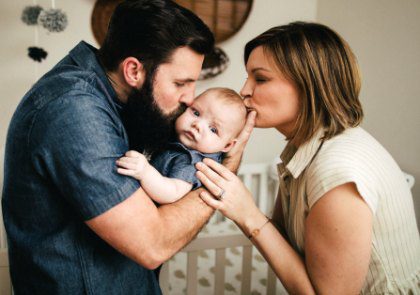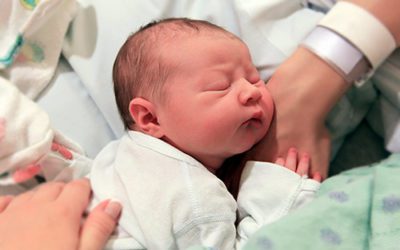
“Will this treatment work?”
“How will it affect my PCOS?”
“What will it do to my body?”
“Am I pregnant, or is this PCOS?”
A new report sheds more light on the causes of polycystic ovarian syndrome. Recent research shows that it may be “triggered before birth, in the womb” according to New Scientist. Polycystic ovaries are currently the most common cause of fertility issues in women; worldwide, PCOS affects up to one in five women.
Currently, the treatment for PCOS achieves pregnancy in less than 30% of women. However, a polycystic ovarian syndrome diagnosis doesn’t have to mean you can never become a mother. Thousands of women diagnosed with polycystic ovarian syndrome turn to adoption every year.
“We started fertility treatment with a specialist who was familiar with PCOS…Every month when I got my period, I experienced a disappointment like I had never felt. So many emotions but ultimately one step further from our ultimate goal of parenthood. I really wanted to be a mom and, when it came right down to it, having a biological connection was not very important to me. It was our fertility doctor who started the adoption discussion with me – around month eight after our sixth unsuccessful IUI,” shares Dina Stonberg in “My PCOS Adoption Story” from a 2018 issue of PCOS Challenge Magazine.
As you think about moving forward to adoption from a polycystic ovarian syndrome diagnosis, here are the steps to take:
1. Grief and Acceptance
Infertility is one of the biggest struggles that couples face on their road to building their family. It’s not easy, nor is deciding to seek adoption after infertility due to PCOS. Before you start an adoption journey, it’s important to fully grieve your inability to have biological children.
Healthy grieving is one of the most important components of moving on from infertility. Couples should move through the stages of grief at their own speed, and you might not move at the same pace as your spouse. Allow yourself to feel whatever emotions might come up, be it anger, sadness, or both. Let yourself start imagining growing a family through adoption.
While there might be things you miss about pregnancy, there are plenty of beautiful moments brought from adoption. Adoptive mom Dina Stonberg describes meeting her daughter for the first time: “It was magical. You forget that she did not come out of your body. You forget everything. All you see is this beautiful baby. Eight years later, we are raising a feisty, sassy, Jewish, African American girl whom everybody says looks exactly like my husband and talks just like me. It is a miracle. She is a miracle. Our miracle.”
Adoption has many beautiful moments, like when you receive “the call” that a birth mother has picked you, holding your baby for the first time, and creating a bond with your child’s birth parents. The joy that adoptive couples experience in having their lifelong dreams realized after so much heartache is immeasurable. Once you have accepted that biology is not what makes a child yours, you’ve taken the first step towards adoption.
2. Desire to Experience Parenthood
After you’ve fully grieved infertility, you might start thinking about whether you’re more interested in experiencing parenthood or a pregnancy.
Consider what was important to you about conceiving. Do you want to experience a pregnancy, or is it more important to you to experience parenthood?
Couples who are still concerned about their child not sharing their genes might not be ready to consider adoption just yet. But if you recognize that you want to love and guide a child, you may be ready to start the adoption process after infertility.
“What I can tell you about adoption is this: There is always a baby at the end. You will forget that you are not biologically related. They are no less your child than if he or she grew inside you. You will not love him or her any less than a biological child…there is a whole community of people out there for whom adoption is a dream come true,” says adoptive mom Dina Stonberg.
 3. Connect With Your Spouse
3. Connect With Your Spouse
When it comes to PCOS and adoption, it’s crucial that you and your spouse are on the same page. Since we don’t all grieve at the same pace or in the same ways, you might be at different stages.
It’s not fair to hold back from sharing that you aren’t fully committed to adoption, nor is it fair push your spouse into adoption before he or she is ready. Since you’re a team, both of you need to be in the same frame of mind to build your family.
If you decide to adopt, it’s important that you’re both truly excited about the process — it’s not right if you feel like you are “settling” for adoption.
4. Research Adoption Professionals
Once you’ve concluded that you’re ready to pursue adoption, you can start researching the professionals who will help you adopt. Your adoption professional will guide you throughout this process, so it’s important to contract with one that you’re comfortable with.
Here at Lifetime, each adoptive couple works one-on-one with a dedicated Adoption Coordinator who leads them throughout the adoption process, answers questions as they come up, and ensures that all the items needed to adopt are completed. Lifetime Adoption also provides you with high-quality monthly adoption webinars, the option to freeze your contract in the event of an emergency, and referrals to highly-qualified professionals for legal representation and the adoption home study. You can learn more about what to expect with a Lifetime Adoption here.
To learn more about PCOS and adoption, or to start pursuing adoption after infertility, please don’t hesitate to call Lifetime Adoption at 1-800-923-6784.
Once you and your spouse are ready to adopt, please complete
Lifetime’s free online application!
As Vice President of Lifetime Adoption, Heather Featherston holds an MBA and is passionate about working with those facing adoption, pregnancy, and parenting issues. Heather has conducted training for birth parent advocates, spoken to professional groups, and has appeared on television and radio to discuss the multiple aspects of adoption. She has provided one-on-one support to women and hopeful adoptive parents working through adoption decisions.
Since 2002, she has been helping pregnant women and others in crisis to learn more about adoption. Heather also trains and speaks nationwide to pregnancy clinics to effectively meet the needs of women who want to explore adoption for their child. Today, she continues to address the concerns women have about adoption and supports the needs of women who choose adoption for their child.
As a published author of the book Called to Adoption, Featherston loves to see God’s hand at work every day as she helps children and families come together through adoption.



 3. Connect With Your Spouse
3. Connect With Your Spouse


0 Comments